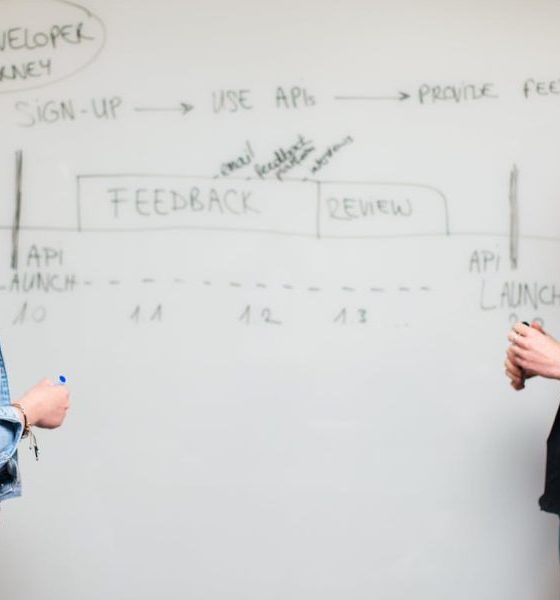

eSports
R&D rethink needed for sportsbooks to harness esports’ power
 Esports betting is still grappling with a perception problem amongst operators. Despite the leaps and bounds in product development made by suppliers – particularly in the last two years – esports hasn’t shaken off the image built in the late 2010s.
Esports betting is still grappling with a perception problem amongst operators. Despite the leaps and bounds in product development made by suppliers – particularly in the last two years – esports hasn’t shaken off the image built in the late 2010s.
Our good friend, Oliver Niner, Head of Sales at PandaScore, has been kind to share the below article with us.
There’s scepticism around esports betting’s value, how well it can actually perform and what’s needed to make it appeal to bettors. A big part of that comes down to perception, which shapes the research and development (R&D) choices made by each operator.
Self-fulfilling prophecy?
Operators who have put the research and development (R&D) resources into esports are seeing excellent growth, while others are still treating it like part of a long tail. The lack of a uniform approach to esports often translates into hesitancy to be bullish and invest in esports.
Whereas in the United States, post-PASPA sports betting has exploded and operators are seeking to capture as much territory and market share as possible because in most cases, you switch the lights on and the money comes in. It’s, of course, good business sense to take opportunities like this – you can apply the same templates used elsewhere on an incredibly lucrative market.
This kind of approach has been attempted for esports and hasn’t found the same success. Granted, the legislation for betting on esports has been somewhat slower than that of sports betting and iGaming.
However, bullish operators have acknowledged the fact that esports hasn’t found the same success in regulated states and asked what can be done differently, while for others, esports has been thrown into the too-hard basket or relegated to the bargain bucket.
For the latter, the fate of the esports vertical becomes a self-fulfilling prophecy – especially if an operator already using a budget esports product that throttles its very growth.
It takes two to tango
When esports is discussed in broader betting circles, you’ll often hear different versions of the same talking point: the problem with esports is no one is doing it well, it doesn’t innovate.
This argument is a case of the pot calling the kettle black. Esports is a driver of innovation, and it is sportsbook R&D that is holding it back.
Multiple suppliers on the market are investing significant resources into R&D, and bullish operators are leveraging these product innovations to acquire new customers and create engagements made for the internet age.
There are understandable reasons why sports betting doesn’t innovate. It’s largely because operators focus on acquisition, entering new territories and spending money on data rights. But the actual R&D on sportsbook products is left lacking, with ever-increasing cost-per-acquisition (CPA) numbers a clear symptom of this.
It means that if an operator does decide to use or acquire an esports specialist supplier but does little to cater its product and attempts to just lay the sports betting template over the top, of course performance will be throttled.
It’s like putting a Ferrari engine in a Prius – no offence to Toyota or Prius owners.
The same problem exists on the platform supplier front. Platforms are understandably focused on compliance and getting customers live, not necessarily improving models or their products.
Even the idea that if you just acquire an innovative company the problem is solved or you have found the solution, doesn’t hold water. In many cases, the company is acquired and plenty of noise is made about it, but there’s little organisational investment in R&D afterwards.
It’s not just in esports
These problems extend to customer acquisition and marketing for most emerging markets, not just esports. There’s a rush to use the same old playbook in newer sectors because it’s easy.
The fantasy vs. house sector in the US is already experiencing an acquisition arms race. As analyst Dustin Gouker points out, deposit match bonuses for new users on fantasy vs house products have jumped from $100 to as high as $500 in some places.
This is the same race that played out in sports betting and despite the costs, there’s little effort from most operators to try something different. There’s less work when you just put the same acquisition template on an emerging sector and call it a day. This seems to be an accepted practice in the industry, for better or for worse.
Esports betting success requires ongoing dialogue
Rather than attempting to wedge esports into hegemonic sportsbook approaches, sportsbooks need to take a completely unique approach.
The fact is the betting sector has barely scratched the surface – communities of esports fans are still dormant. Canadian operator Rivalry has built a successful, esports-first business by embracing the ever-changing internet culture that esports inhabits. French esports organisation Karmine Corp recently sold out a 30,000-person stadium for an event with no prize money up for grabs.
Innovative products developed on the supplier side like microbetting and betbuilders are only half of the equation.
Maximising esports revenues requires institutional investment, ongoing R&D and collaboration between suppliers and operators to create products and experiences. This includes having staff on the operator side that can drive and push the product further, and crucially, rethinking current sportsbook strategies and practices.
Building experiences for betting’s greatest emerging market – one that caters to your future core audience – takes investment, innovation and a willingness to experiment. If the industry wants to make the most of the Millennial and Gen Z audience that will become its primary customers, investment into R&D and close collaboration between suppliers and operators is needed. Many hands makes light work.
eSports
THE ESPORTS AWARDS CROWNS THE BEST IN ESPORTS FROM THE PAST DECADE, INCLUDING NADESHOT, SJOKZ AND FAKER

The Decade Awards ceremony, held alongside the Esports World Cup as part of the ‘Summer of Celebration’, saw an incredible 9.8 million votes cast by fans, celebrating esports and gaming’s most legendary figures in a landmark tribute to a decade of excellence.
RIYADH, Saudi Arabia, August 24th, 2025: The most prestigious night in the esports calendar returned this evening, as the Esports Awards hosted their one-off special, the “Decade Awards”. Presented by Trevor “Quickshot” Henry, Jessica “JessGOAT” Bolden and Barney Banks, this year’s Decade Awards marked the Esports Awards’ 10th anniversary and honoured a decade of industry-defining achievements and trailblazers in esports across 14 different categories.
Among the evening’s standout honours was League of Legends superstar Lee “Faker” Sang-hyeok, who was named Esports PC Player of the Decade, alongside his team T1, who were crowned Esports Team of the Decade, and their coach Kim “kkOma” Jeong-gyun, recognised as Esports Coach of the Decade. Riot Games were also at the forefront, receiving multiple accolades including Esports Publisher of the Decade, Esports Game of the Decade for League of Legends, and Esports Live Event of the Decade for the unforgettable League of Legends Worlds 2017 Championship.
Marking the grand finale of the Summer of Celebration, the Esports Awards delivered yet another iconic evening, with a star-studded roster of presenters taking to the stage to announce the winners. Highlights included legendary professional skateboarder Tony Hawk, Twitch sensation Tyler1, renowned content creator and Sidemen member Vikkstar, and multiple-time EVO champion Justin Wong.
Over the past decade, the esports scene has grown exponentially, with countless players, teams and creators contributing to its growth into the global phenomenon it is today. Tonight, the Decade Awards celebrated those who have defined the last ten years in esports, honouring the individuals, teams and organisations whose achievements have left a monumental mark on the industry. The complete list of Decade Awards winners is as follows:
- Esports Game of the Decade – League of Legends
- Esports Personality of the Decade – Matthew “Nadeshot” Haag
- Streamer of the Decade – Félix “xQc” Lengyel
- Esports Commercial Partner of the Decade – Intel
- Esports Content and Coverage Platform of the Decade – Liquipedia
- Esports Publisher of the Decade – Riot Games
- Esports Live Event of the Decade – League of Legends Worlds 2017
- Esports PC Player of the Decade – Lee “Faker” Sang-hyeok
- Esports Breakthrough Player of the Decade – Mathieu “ZywOo” Herbaut
- Esports Controller Player of the Decade – Anthony “Shotzzy” Cuevas-Castro
- Esports Coach of the Decade – Kim “kkOma” Jeong-gyun
- Esports Team of the Decade – T1 – League of Legends
- Esports Organisation of the Decade – Team Liquid
- Esports On-Air Talent of the Decade – Eefje “Sjokz” Depoortere
“Over the past ten years, the growth in the esports industry has been incredible to see, and it’s been a great honour to recognise the icons who have contributed to its rise in popularity,” says Mike Ashford, CEO of the Esports Awards, “Tonight, we showed the world just how global and impactful esports has become, and celebrated the individuals and companies that have consistently driven its success. Congratulations to all the winners, and thank you to the esports community for your ongoing dedication and support.”
The Decade Awards is brought to you by the Esports World Cup, Oakley and Media Partner Hitmarker. The full stream can be found here: twitch.tv/esportsawards.
The post THE ESPORTS AWARDS CROWNS THE BEST IN ESPORTS FROM THE PAST DECADE, INCLUDING NADESHOT, SJOKZ AND FAKER appeared first on European Gaming Industry News.
eSports
Hyprop and MTN Launch SHIFT COD Tournament as Part of 2025 Shift Gaming Experience

With four spots, one stage and R60 000 on the line, South Africa’s sharpest squads are gearing up for a Call of Duty clash like no other.
The 2025 Hyprop MTN Shift Gaming Experience is about to get louder, faster and more intense. Hyprop, in collaboration with MTN, is introducing SHIFT COD – a Call of Duty tournament designed to test South Africa’s sharpest squads in a no-excuses, high-pressure arena. Four online qualifiers. One LAN finale. R60,000 in prize money. Only the best survive.
The format stays sharp and unforgiving: each qualifier is a single-elimination best-of-five series. Teams will battle across Hardpoint, Search and Destroy, and Control. Only the top squad from each of the four qualifier events will earn a shot at the LAN finale, taking place at Canal Walk on 12 and 13 September. Finalists will cover their own travel and accommodation, but the stage – and the spotlight – will be waiting.
“The Shift Gaming Experience is about putting real competition at the centre of public spaces and connecting people through the power of play,” said Christie Stanbridge, Brand and Campaigns Marketing Manager at Hyprop. “Adding Call of Duty to the lineup takes the intensity up a notch. We’re giving gamers a serious platform to show what they can do – live, on stage and in front of a crowd.”
The four qualifiers took place online, where teams signed up for free:
All qualifier finals were broadcast, giving fans full access to the action and allowing players to gain exposure beyond the scoreboard.
Four teams qualify for the LAN finale, where they’ll compete in a double-elimination bracket for a prize pool structured as follows:
- 1st place: R30,000
- 2nd place: R15,000
- 3rd place: R10,000
- 4th place: R5,000
Now in its third year, the Hyprop MTN Shift Gaming Experience has become one of the country’s most visible platforms for esports and casual gaming. Hosted at Hyprop-owned malls including Canal Walk, Clearwater and The Glen, the experience blends competitive tournaments with public engagement to bring gaming into the mainstream.
“MTN SHIFT isn’t about gimmicks. It’s built for players, whether you’re grinding in ranked or showing up to prove a point on LAN,” said Stanbridge. “We’ve seen how gaming can energise our spaces and create new communities. SHIFT COD builds on that energy.”
With only four LAN spots available, the window to make your mark is narrow, and the competition will be ruthless. Visit acgl.gg/mtnshift.
Remaining Tournament Dates & Venues:
SHIFT COD is part of the MTN Shift Gaming Experience which takes place at:
Capegate – Online Qualifier: 31 Aug | In-Centre Event: 5 – 7 Sep
Canal Walk – Online Qualifier: 7 Sep | In-Centre Event: 17 – 21 Sep
The post Hyprop and MTN Launch SHIFT COD Tournament as Part of 2025 Shift Gaming Experience appeared first on European Gaming Industry News.
eSports
Lim “Ulsan” Soo-hoon Fights off the Competition to Reign as TEKKEN 8 at 2025 Esports World Cup Champion, Securing Back-to-Back EWC Titles

Lim “Ulsan” Soo-hoon has claimed the TEKKEN 8 at EWC 25 crown having beaten Yoon “LowHigh” Sun-woong in a 5-2 grand final finish. His victory secures DN Freecs their first win at EWC 25 as he takes home $250,000 of the $1,000,000 prize pool.
Lim “Ulsan” Soo-hoon had a strong run at EWC 25, losing just one series against Kim “Kkokkoma” Mu-jong in the first match of the second phase. From that point on, however, he went unbeaten on his way to the grand final, even taking down Kim “Kkokkoma” Mu-jong for revenge on his way back from the lower bracket.
In the semifinals, Lim “Ulsan” Soo-hoon booked his place in the grand final with a 5-3 finish over Kim “CherryBerryMango” Jae-hyun, securing his second EWC TEKKEN 8 grand final in a row. Ulsan showcased his mastery of Dragunov throughout the grand final, setting the scene with a decisive victory in the first set, before taking the title in the seventh set with a 5-2 win.
His grand final opponent, Yoon “LowHigh” Sun-woong, took down Team Vitality’s Jeon “JeonDDing” Sang-hyun in a 5-2 finish to lock his place in the grand final. The former EVO champion displayed his Bryan skills throughout the final against Ulsan, but it wasn’t enough to overcome the overall winner.
“I never expected this. I cannot imagine I would win again. I mean, this year I had a rough start; there was a nerf to Dragunov, I had a lot of difficulties – I wanted to prove myself on this stage, and I have done it,” said Lim “Ulsan” Soo-hoon. “It’s been like a dream to be here. Thank you to those who support me from everywhere, my team, my friends, all my partners, and especially the Kingdom of Saudi Arabia for making this the biggest tournament in the world.”
“I’m still hungry. I just want to make myself a legend,” said Lim “Ulsan” Soo-hoon.
Lim “Ulsan” Soo-hoon secured 1000 Club Championship points for DN Freecs, who, as a result, jumped up to joint-eleventh place in the Club Championship standings, with 1200 points. Despite having three players in the top eight, DN Freecs will only receive one lot of points.
It was a disappointing showing from Team Falcons in TEKKEN 8, as all three representatives were eliminated before earning any points. With only a few games left to earn points, Team Falcons had high hopes for TEKKEN 8. Elsewhere, Twisted Minds, who secured victory earlier in the day in PUBG, failed to make it two for two on Saturday, also failing to score points in TEKKEN 8 as Arslan “Arslan Ash” Siddique was eliminated by overall winner, Lim “Ulsan” Soo-hoon.
The post Lim “Ulsan” Soo-hoon Fights off the Competition to Reign as TEKKEN 8 at 2025 Esports World Cup Champion, Securing Back-to-Back EWC Titles appeared first on European Gaming Industry News.
-

 gaming3 years ago
gaming3 years agoODIN by 4Players: Immersive, state-of-the-art in-game audio launches into the next generation of gaming
-
EEG iGaming Directory8 years ago
iSoftBet continues to grow with new release Forest Mania
-
News7 years ago
Softbroke collaborates with Asia Live Tech for the expansion of the service line in the igaming market
-
News7 years ago
Super Bowl LIII: NFL Fans Can Bet on the #1 Sportsbook Review Site Betting-Super-Bowl.com, Providing Free Unbiased and Trusted News, Picks and Predictions
-
iGaming Industry8 years ago
Rick Meitzler appointed to the Indian Gaming Magazine Advisory Board for 2018
-
News7 years ago
REVEALED: Top eSports players set to earn $3.2 million in 2019
-
iGaming Industry8 years ago
French Senator raises Loot Boxes to France’s Gambling Regulator
-
News7 years ago
Exclusive Interview with Miklos Handa (Founder of the email marketing solutions, “MailMike.net”), speaker at Vienna International Gaming Expo 2018










